- Home
- Shirlee McCoy
Home at Last
Home at Last Read online
HOME AT LAST
“You’re a big part of the kids’ lives,” she said, knowing there was more to it than that. Knowing that if she’d lived another life and met him in another place, they’d be doing more than lying on the dock, looking into each other’s eyes.
“I hope so. I don’t want to be the uncle they barely remember. Not anymore.”
“You’ll be the uncle who taught them about building fences and making paddocks and riding horses. The one who helped their mother find her way back home.”
“You’ve always been home.”
“Not really.” She shook her head, the aching pain behind her eyes still there and still insistent, but the tears were gone, and the anger. “I’ve been living in my house for months, but I haven’t been home.”
“Then I’m glad I helped you find your way.” His lips brushed her cheek, and her pulse jumped, a million butterflies flittering in her stomach....
Books by Shirlee McCoy
The Apple Valley Series
THE HOUSE ON MAIN STREET
THE COTTAGE ON THE CORNER
THE ORCHARD AT THE EDGE OF TOWN
The Home Sweet Home Series
SWEET HAVEN
SWEET SURPRISES
BITTERSWEET
The Bradford Brothers
HOME WITH YOU
HOME AGAIN
HOME AT LAST
THE MOST WONDERFUL TIME
(with Fern Michaels, Stacy Finz, and Susan Fox)
Published by Kensington Publishing Corporation
HOME At LAST
SHIRLEE
MCCOY
ZEBRA BOOKS
KENSINGTON PUBLISHING CORP.
www.kensingtonbooks.com
All copyrighted material within is Attributor Protected.
Table of Contents
HOME AT LAST
Also by
Title Page
Copyright Page
Chapter One
Chapter Two
Chapter Three
Chapter Four
Chapter Five
Chapter Six
Chapter Seven
Chapter Eight
Chapter Nine
Chapter Ten
Chapter Eleven
Chapter Twelve
Chapter Thirteen
Chapter Fourteen
Chapter Fifteen
Epilogue
ZEBRA BOOKS are published by
Kensington Publishing Corp.
119 West 40th Street
New York, NY 10018
Copyright © 2019 by Shirlee McCoy
All rights reserved. No part of this book may be reproduced in any form or by any means without the prior written consent of the Publisher, excepting brief quotes used in reviews.
To the extent that the image or images on the cover of this book depict a person or persons, such person or persons are merely models, and are not intended to portray any character or characters featured in the book.
If you purchased this book without a cover you should be aware that this book is stolen property. It was reported as “unsold and destroyed” to the Publisher and neither the Author nor the Publisher has received any payment for this “stripped book.”
Zebra and the Z logo Reg. U.S. Pat. & TM Off.
BOUQUET Reg. U.S. Pat. & TM Off.
ISBN: 978-1-4201-4526-7
ISBN-13: 978-1-4201-4527-4 (eBook)
ISBN-10: 1-4201-4527-4 (eBook)
Chapter One
Sunday Bradshaw was out of breath by the time she made it down the stairs. Panting and sweating like she’d run a marathon when all she’d done was descend fifteen steps.
Fifteen!
Her legs were shaking, her heart thumping. She’d have sat right there at the bottom of the stairs and stayed until dawn, but she was afraid Rosie would find her, sound the alarm, and mobilize everyone in the house to help “Poor Ms. Bradshaw.”
Good Lord! She hated being called that.
She hated hearing it whispered when she was limping through the five-and-dime with one of the kids or moving at a snail’s pace down the aisle at church. She hated hearing Rosie tell Matt’s brothers that “Poor Ms. Bradshaw” just needed a little more time.
As if that would ever be enough to get over losing her memories, her independence. Losing Matt.
Losing the world they’d been creating together.
The world you’d been creating, that voice in her head said. The one that had been speaking loudly ever since she’d been released from rehab.
She tried not to listen, because there was no sense holding on to old disappointments. She’d already lost enough, and she didn’t want to lose her joy with it.
Not that she had much of that left either.
She shuffled down the hall and stepped into the living room, the old furniture well-worn and comfortable, hand-me-downs from the days when she’d lived there with her parents.
Life had been a lot simpler then.
A lot less stressful and busy.
She might have lost days and weeks and months and years of her memories, but she knew that.
She crossed the room and settled into the old recliner. It was true she spent too much time sitting there, listening to the kids play outside or watching as they read books on the couch or love seat. Every day, she told herself she should be reading to them. She told herself she should be outside in the cooling days of late summer, laughing as they cartwheeled and blew dandelion seeds into the air.
She also told herself she should make dinner, wash the kids’ clothes, go to the school to see what teachers they each would have in the fall. She told herself a lot of things, and then she sat in the recliner and let others do what she used to.
It was the path of least resistance, and she was embarrassed that she kept taking it. Before the accident, she’d hit the ground running. Every morning, she’d been up before dawn, making lunches and doing chores. If she had enough courage for it, she’d spend time going through the farm’s books, trying to organize receipts that Matt left in the bottom drawer of the file cabinet. Piles and piles of receipts. Matt liked to buy stuff. He liked to give stuff away. That hadn’t bothered her as much before they’d had kids. After . . .
Well, she’d spent a little too much time worrying about finances the last few years.
Funny how she could remember that, but she couldn’t remember what Matt had been wearing the night of the accident. She couldn’t remember where they’d gone to eat dinner. She could remember the lights, though—high beams coming straight at them.
She saw those lights in her dreams, woke with a scream dying on her lips.
But like so many other things, the rest of the night was lost to her.
She blinked, rubbing suddenly sweaty palms over worn yoga pants. She was afraid. At night, when the house was asleep, she could admit that. If she could have gotten away with it, she’d have spent the rest of her life inside. She’d have kept the children there too. Playing board games on the floor nearby or reading quietly as she rested her eyes. They’d be safe there. No drunk drivers coming at them in the dead of night. No strangers lurking in the shadows hoping to steal them away.
No heartache from being betrayed by the only person they’d ever loved.
She winced away from the thought, because dwelling on it wouldn’t change anything.
That was another irony—remembering the betrayal when she’d forgotten so much. She’d have preferred to forget. It would have made life a little easier.
Or at least a little less sad.
There was a photo on the mantel. One she’d spent hours staring at these past few weeks. Even in the darkness, she found it easily, lifting the ornate crystal frame and carrying it to the window. The curtains were closed, and she p
ulled them open, letting moonlight filter in. In the grayscale world it created, she could see herself as she’d been on her wedding day—glowing in the 1920s lace dress that had been worn by three generations of brides before her.
And there was Matthias, handsome in his tuxedo.
She touched his face, her finger sliding across cool glass instead of warm flesh.
She’d loved him the first time she’d seen him—a mischievous dark-haired six-year-old late for his first day of first grade. She’d loved him all through elementary, middle, and high school. She’d loved him the day they’d married.
Even after she’d learned the truth about all those business trips to Seattle, she’d loved him.
She liked to think they’d have made it. That they’d have survived his affair and grown closer and stronger and gone on. Not for the sake of the kids, but for the sake of the love they’d always had for each other.
She’d never know for sure, though.
She set the photo down, her arm shaking from the weight of it. She went to physical therapy three times a week. She was supposed to be getting stronger. Maybe she was, but life was a lot harder than it used to be. Simple things like walking down stairs or showering or making an egg on the old gas stove had to be planned out, and when she finally completed a task, she was too tired to start another one.
What had happened to the cheerful, chipper, energetic young woman she’d heard about? Where had the Sunday Bradshaw who could raise six kids, keep a house clean, balance impossible-to-balance checkbooks, plant lush gardens and make beautiful magazine-worthy meals gone? Well-meaning friends came to visit and listed all Sunday’s amazing accomplishments. She wasn’t sure if they were complimenting her or trying to motivate her. Either way, they were failing.
She didn’t want to be complimented on the woman she’d been.
She didn’t want to be motivated to be that woman again.
Mostly, she just wanted to be left alone.
Trying to remember names and faces of people she should know well was exhausting. Trying to keep track of those she hadn’t known well was nearly impossible. Traumatic brain injury did that to a person. Lost synapses and misfiring neurons. The neurologist assured Sunday that things would improve.
Sunday spent a lot of time thinking that might happen too late.
Too late to regain her life.
Too late to make up for the fact that she’d missed out on so much of her children’s lives.
By the time things “got better,” the kids would be happy in lives that barely included her.
She hated that, and she was trying to change it.
But every day she failed in a dozen different ways.
Just yesterday, she’d heard Heavenly ask her uncle Sullivan to take her shopping for a dress she needed for a state choir competition. She’d already asked Sunday three times. Three times, Sunday had promised to take her and forgotten. That’s what Heavenly had told Sullivan. There’d been just enough bitterness in her voice to break Sunday’s heart.
“At least they have your brothers. Right, Matt?” she whispered into the silence.
No answering whisper from Matthias.
Not that she’d expected one.
Even if Matt could have found a way back from Heaven, she doubted he’d have returned to the farm. He’d have had bigger fish to fry. Places to explore. New sights to see. All the things he’d pretended not to care about while they were married.
Maybe if she’d known the truth . . .
But she hadn’t.
At least, she didn’t think she had.
Her memories weren’t sharp or clear, and lately she wondered if everything she remembered about her relationship with Matt was a fantasy she’d concocted to make herself feel better about his betrayal.
Betrayals? Maybe. Probably.
That was another thing she didn’t want to think about.
Tears burned the back of her eyes.
She forced them away.
She couldn’t waste hours and days thinking about what had been or mourning what would never be. She had six children, for God’s sake. They were depending on her. She had to figure out how to move past the emptiness, the lost memories, the sorrow. Step into this new life she’d been given. God was the God of second chances, right?
And this was hers.
She didn’t want to waste it.
She walked back through the hall and into the kitchen, passing the 1920s stove and the old farmhouse sink. She loved the old appliances, the creaky floor, the nicked table where the kids did their schoolwork. Matt had talked about nicer things. She was certain of that. She could almost hear his cheerful voice listing all the wonderful new things they’d have once the farm was up and running. A brand new stainless-steel stove. A larger refrigerator. A new dinette set. She’d thought he was just thinking aloud, wanting nicer things for her sake.
I still love you. You know that, Sunday.
She thought he’d said that the night of the accident. She could picture him sitting across the table from her, a glass of wine near his elbow, his blue eyes filled with remorse and concern.
Only she wasn’t sure if the memory was real or if she’d conjured it.
And, she wasn’t sure if his love were a better thing or a worse one. Because, she couldn’t understand—no matter how hard she tried—how it was possible to love someone and still hurt her so deeply.
All she knew was that she’d loved him enough to go to dinner that one last time, to give him a second chance he hadn’t really earned.
That willingness had cost him everything, and her a lot.
Her chest ached with the thought, her heart throbbing painfully, the panic that was always just beneath the surface, trying to bubble up and take control.
She stumbled to the back door, shoved it open, and stepped outside, gasping for air that didn’t seem to want to fill her lungs.
She’d been prescribed anti-anxiety medicine, and she’d taken it for a while. Now, she tried to rely on the techniques her therapist had taught her.
Breathe in. Breathe out. Find your grounding. Focus on the here and now—the late summer air, the kiss of moonlight above the trees, the soft rustle of leaves and grass as nocturnal animals moved through.
She limped down the back steps and shuffled through freshly mown grass. The moon was high and bright and beautiful, illuminating the path from the house to the gate. Not that she needed light to navigate. She’d walked this way hundreds of times. Maybe thousands. Even if her memory failed, her feet knew the way. She didn’t have to think about where to step or how. She didn’t have to worry about tripping over roots or wandering in the wrong direction.
This she knew.
This was easy.
She opened the gate and walked through. Fields of corn stretched as far as the eye could see. Beyond them, the Spokane River flowed sluggishly. There hadn’t been much rain this year, but Matt’s brothers had kept the crops growing. There would be a good harvest for the first time since her father’s death. Ten years. Or was it eleven?
Time was as murky and misty as her memories tended to be.
She crossed the country road, knowing exactly where she was heading. She didn’t allow herself to think about it. She didn’t question her reasons. She picked her way down the steep hill that led to the riverbank, followed the silvery flow of water to the footbridge that had been stabilized by Matt’s brothers. Listened to the soft sounds of country life as she crossed from one side of the river to the other.
Water lapped against the rocky shore. An owl called from its perch somewhere in the grove of pine trees that stood watch over the river. A gentle breeze rustled the grass and sent spent leaves skittering across the pebbly beach. The night was exactly as it should be. Except that she was alone.
How odd to be single after so many years of being part of a couple.
Matt and Sunday. Sunday and Matt. Everyone in the small town of Benevolence talked about them as if they were one unit, one entity.
<
br /> Only now Matt was gone.
She stepped onto the bridge, grabbing the handrails on both sides as she made her way across the river. Boulders peeked above the surface of the water, the soft splash of waves a sweet familiar melody.
She knew this place better than she knew herself.
She knew the curves of the riverbank, the dips and rises of the land. She knew the heartbeat of the earth and the whispered breath of the towering pine trees.
She’d thought she could teach it to Matt and the kids.
She’d thought that if she put enough time and effort and love into her family and the farm, everything would be okay.
This was far from okay—her painstaking trip across the bridge that she should have been able to run across. Her hobbled steps as she headed toward the path that led to the old family cemetery.
Forgotten shopping trips and missed opportunities and kids growing up while she sat in a chair and watched life pass by weren’t part of the life she’d planned to build.
She had been left behind to finish the work she and Matt had begun together.
And, she wasn’t doing a very good job of it.
That was the worst part of all. She was failing, and she didn’t know how to stop the freefall, put on the brakes, change directions.
She sighed, picking her way up the hill that led to the chapel her family had built over a century ago. For a while, it hadn’t been much more than ruins. Just a few months ago, the kids, her brothers-in-law, and her friend Clementine had rebuilt it, creating a beautiful, peaceful place for those who needed it.
She needed it.
She needed a lot of things.
Mostly, she thought she just needed to learn how to live this second-chance life.
Behind her, an animal yipped. A coyote, maybe. Or a fox. Whichever it was, it sounded like it was in distress. She scanned the area, walking back the way she’d come, following the sound because she could never leave an injured animal to fend for itself.

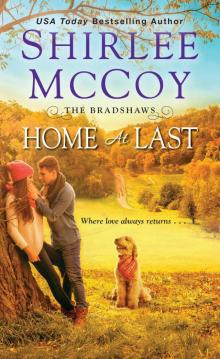 Home at Last
Home at Last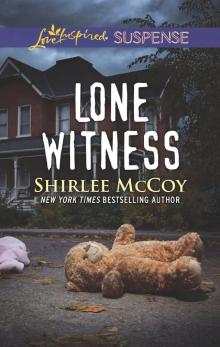 Lone Witness
Lone Witness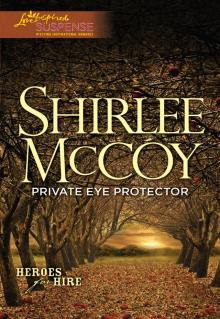 Private Eye Protector
Private Eye Protector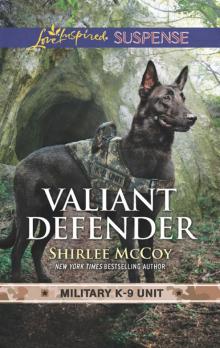 Valiant Defender
Valiant Defender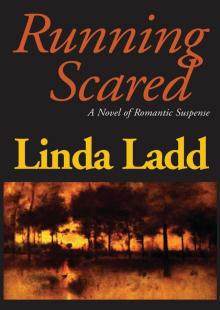 Running Scared
Running Scared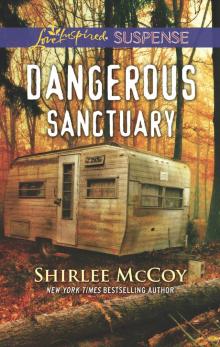 Dangerous Sanctuary
Dangerous Sanctuary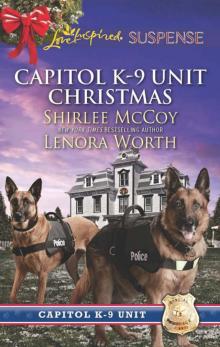 Capitol K-9 Unit Christmas: Protecting VirginiaGuarding Abigail
Capitol K-9 Unit Christmas: Protecting VirginiaGuarding Abigail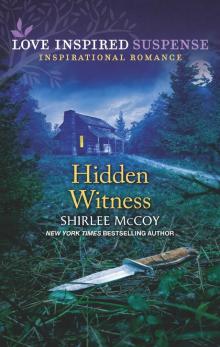 Hidden Witness
Hidden Witness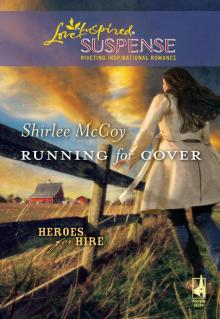 Running for Cover
Running for Cover Gone
Gone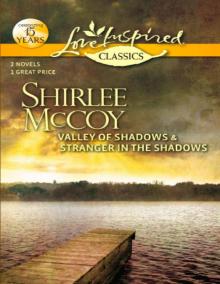 Valley of Shadows and Stranger in the Shadows: Valley of ShadowsStranger in the Shadows
Valley of Shadows and Stranger in the Shadows: Valley of ShadowsStranger in the Shadows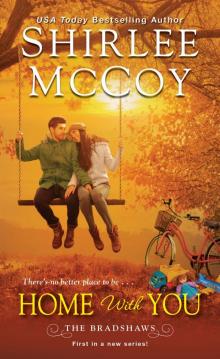 Home with You
Home with You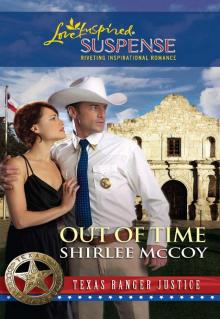 Out of Time
Out of Time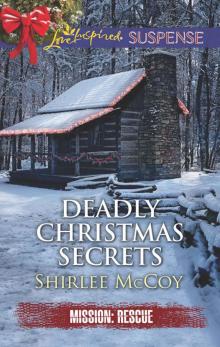 Deadly Christmas Secrets
Deadly Christmas Secrets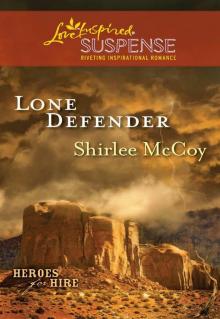 Lone Defender (Love Inspired Suspense)
Lone Defender (Love Inspired Suspense)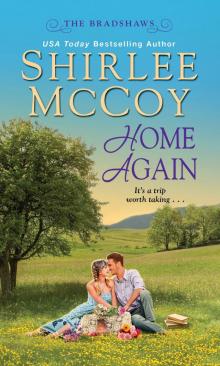 Home Again
Home Again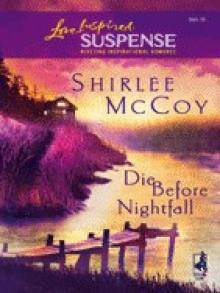 Die Before Nightfall
Die Before Nightfall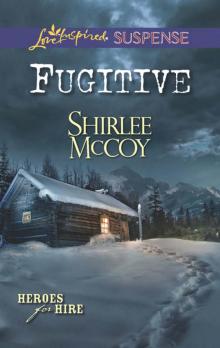 Fugitive
Fugitive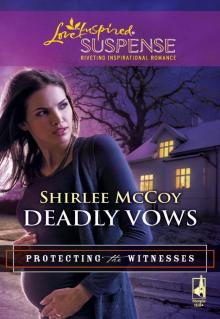 Deadly Vows
Deadly Vows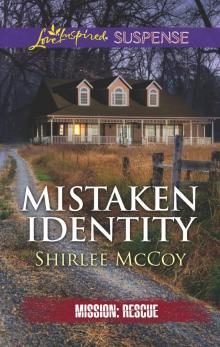 Mistaken Identity
Mistaken Identity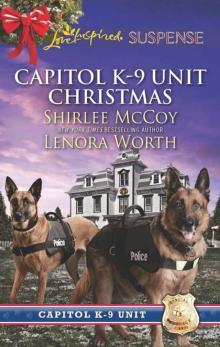 Capitol K-9 Unit Christmas
Capitol K-9 Unit Christmas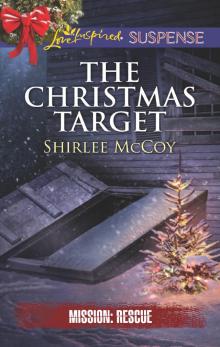 The Christmas Target
The Christmas Target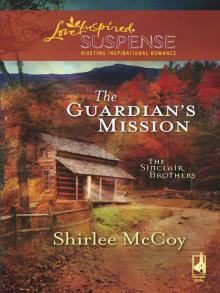 SB01 - The Guardian's Mission
SB01 - The Guardian's Mission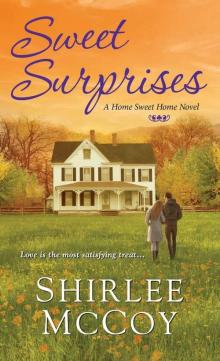 Sweet Surprises
Sweet Surprises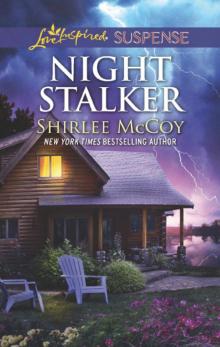 Night Stalker
Night Stalker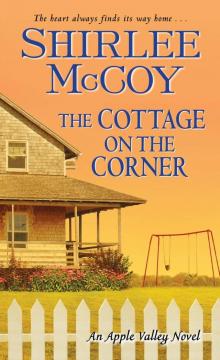 The Cottage on the Corner
The Cottage on the Corner Love Inspired Suspense January 2014
Love Inspired Suspense January 2014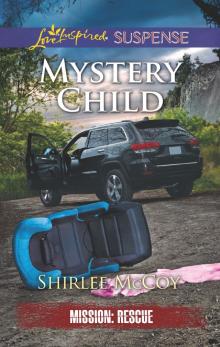 0373447477 (R)
0373447477 (R) Love Inspired Suspense March 2015 - Box Set 1 of 2: Protection DetailHidden AgendaBroken Silence
Love Inspired Suspense March 2015 - Box Set 1 of 2: Protection DetailHidden AgendaBroken Silence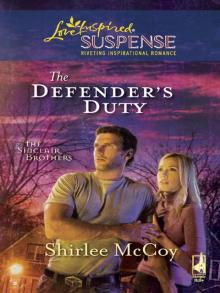 SB03 - The Defender's Duty
SB03 - The Defender's Duty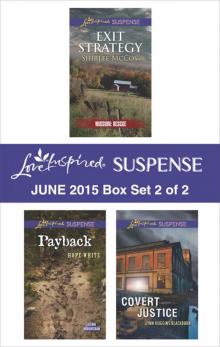 Love Inspired Suspense June 2015 - Box Set 2 of 2: Exit StrategyPaybackCovert Justice
Love Inspired Suspense June 2015 - Box Set 2 of 2: Exit StrategyPaybackCovert Justice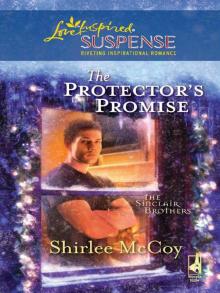 The Protector's Promise (The Sinclair Brothers)
The Protector's Promise (The Sinclair Brothers) Bodyguard
Bodyguard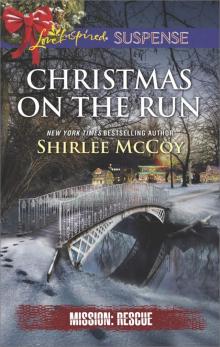 Christmas on the Run
Christmas on the Run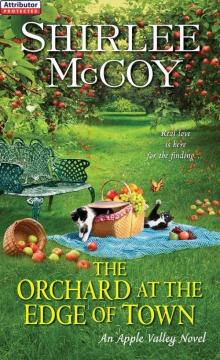 The Orchard at the Edge of Town
The Orchard at the Edge of Town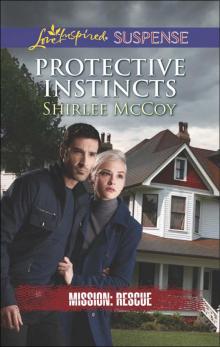 Protective Instincts
Protective Instincts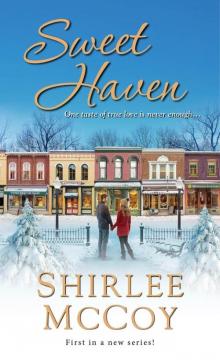 Sweet Haven
Sweet Haven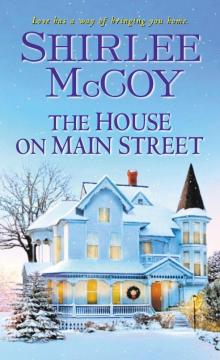 The House on Main Street
The House on Main Street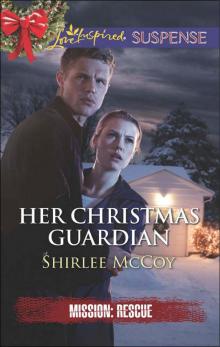 Her Christmas Guardian
Her Christmas Guardian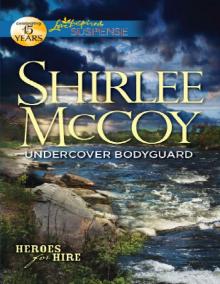 Undercover Bodyguard
Undercover Bodyguard